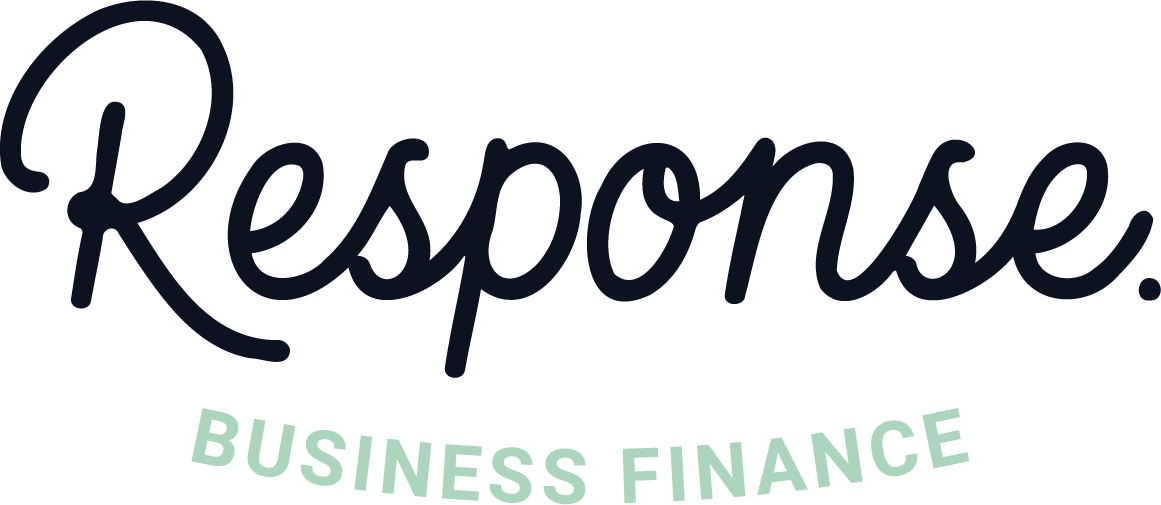
Blog Article by Response Business Finance
What Type of Business Loan is Right for Your Startup?
Starting a business is exciting, but finding the right funding can feel overwhelming. With so many loan types available, how do you know which one fits your start-up’s needs? The answer depends on what you’re buying, how much you need, and what stage your business is at.
Let’s break down the main start-up loan options and help you figure out which one makes sense for your situation.
Why Most Start-ups Need External Funding
Unless you’ve got serious personal savings, most start-ups need external funding to get off the ground. Whether it’s equipment, stock, marketing, or just keeping the lights on whilst you build your customer base, cash flow is usually tight in those early months.
The good news? There are several funding options designed specifically for new businesses. The key is matching the right type of loan to what you actually need the money for.
If your business is still very new, check out what to do if you’re struggling to get a loan with limited trading history — even early-stage start-ups can qualify with the right approach.
Asset Finance: When You Need Equipment or Vehicles
If your start-up needs specific equipment, machinery, or vehicles to operate, asset finance could be your best bet. The equipment itself acts as security for the loan, which means lenders are often more willing to support new businesses.
Perfect for:
- Manufacturing equipment
- Commercial vehicles
- IT systems and technology
- Kitchen equipment for restaurants
- Medical equipment for healthcare start-ups
How it works: You typically put down a deposit (usually 10-30%), and the lender covers the rest. Monthly payments are spread over 2-7 years, depending on the equipment’s expected lifespan.
Take RuffEdge Sharpening Services – they used asset finance to secure high-quality sharpening equipment when they were just starting out. Without trading history, the equipment itself gave the lender confidence to approve the funding.
Need equipment for your start-up? Get FCA-regulated asset finance advice tailored to new businesses – we help you secure the kit you need to launch successfully.
Unsecured Business Loans: Maximum Flexibility
Unsecured loans don’t require any security, making them ideal for general start-up costs like marketing, stock, website development, or cash flow support. The downside? They’re harder to get as a start-up because lenders rely entirely on your business plan and personal credit history.
Great for:
- Marketing and advertising
- Initial stock purchases
- Website development
- Working capital
- Staff training
What you’ll need: A solid business plan, good personal credit score, and often a personal guarantee. Interest rates are typically higher than secured loans, but you get complete flexibility on how you spend the money.
Not sure if an unsecured loan is better than a secured option? Read our full guide on secured vs unsecured business loans to understand the key differences.
Equipment Loans vs Hire Purchase: What’s the Difference?
Both help you get equipment, but the ownership structure differs:
Equipment loans: You own the equipment from day one. The loan is secured against the equipment, but it’s yours immediately.
Hire purchase: You pay monthly instalments and own the equipment at the end of the agreement. Often requires a smaller deposit.
For most start-ups, the practical difference is minimal – pick whichever offers better terms.
Invoice Finance: For Service-Based Start-ups
If your start-up provides services to other businesses, you might face the classic cash flow problem – waiting 30-60 days to get paid whilst still needing to cover costs. Invoice finance lets you unlock up to 90% of your invoice value within 24 hours.
Best for:
- Consulting services
- Marketing agencies
- Professional services
- Any B2B service with payment terms
How it works: You send your invoice to the finance company, they advance you most of the money, then collect payment from your customer. You pay a small fee for the service.
This works even for new businesses – the key is having creditworthy customers who will pay their invoices.
Credit Facilities and Drawdown Loans: Building for Growth
Some start-ups benefit from having access to funding they can draw on as needed, rather than taking a lump sum upfront. Credit facilities work like a business overdraft – you only pay interest on what you actually use.
Ideal for:
- Seasonal businesses
- Companies with unpredictable cash flow
- Businesses planning to scale quickly
- Franchise operations
Float Hub used this approach effectively, combining equipment finance with a credit facility to handle their evolving needs as they built London’s premium floatation therapy centre.
Planning to scale your start-up? Flexible credit facilities give you funding when you need it – speak to our team about growth-focused finance solutions.
New Start Loans: Designed for Start-ups
Many lenders offer specific “new start” or “start-up” loan products. These are typically unsecured loans with criteria designed around new businesses rather than established trading history.
Features:
- Lower documentation requirements
- Acceptance of business plans instead of trading accounts
- Faster approval processes
- Often combined with business mentoring
Zen Beauty used a new start loan to cover marketing and setup costs whilst using asset finance for their beauty equipment – a smart combination that addressed both their immediate and long-term needs.
How to Choose the Right Option
Ask yourself these questions:
What do you need the money for?
- Specific equipment → Asset finance
- General business costs → Unsecured loan
- Cash flow gaps → Invoice finance or credit facility
How much do you need?
- Under £25,000 → Unsecured loans often work well
- £25,000+ → Consider secured options for better rates
What can you put down as security?
- Equipment purchase → Use the equipment as security
- No physical assets → Unsecured loans or invoice finance
How quickly do you need it?
- Urgent → Invoice finance (24 hours) or specialist start-up lenders
- Standard → Most options take 1-2 weeks
Mixing and Matching: The Multi-Product Approach
Many successful start-up’s use a combination of funding types. For example:
- Asset finance for equipment
- Unsecured loan for marketing and setup costs
- Credit facility for ongoing cash flow management
This approach lets you optimise each funding stream for its specific purpose whilst keeping costs manageable.
Working with the Right Finance Partner
Finding funding as a start-up can be challenging because many lenders don’t understand new businesses. Look for brokers or lenders who:
- Have experience with start-ups in your sector
- Take time to understand your business plan
- Offer multiple funding options
- Provide ongoing support, not just a one-off transaction
The right finance partner becomes part of your team, helping you navigate challenges and plan for growth – not just someone who processes an application.
Getting Your Application Ready
Whatever loan type you choose, preparation is key:
- Business plan: Clear, realistic projections and strategy
- Personal credit check: Know your score before applying
- Financial projections: Cash flow forecasts for at least 12 months
- Industry research: Show you understand your market
- Security details: For secured loans, have equipment quotes ready
The Bottom Line
There’s no single “best” start-up loan – it depends entirely on your specific needs, industry, and circumstances. Asset finance works brilliantly if you need equipment. Unsecured loans give maximum flexibility. Invoice finance solves cash flow problems for service businesses.
The key is matching your funding to your actual requirements, not just taking whatever’s easiest to get. And remember – you don’t have to go it alone. The right finance partner will help you structure a funding package that sets your start-up up for long-term success.
Ready to explore your options?
We specialise in helping start-ups find the right funding mix for their specific needs. Fast, FCA-regulated advice tailored to your business – because we know that getting the funding right from the start makes all the difference to your success.
Frequently Asked Questions
Mark Squires
Managing Director
Mark Squires is a seasoned professional with a passion for transforming how businesses access finance. As the founder of Response Business Finance (RBF), Mark leads a boutique commercial brokerage built on the principles of sensibility, ethics, and proactivity. His vision is simple yet profound: to make commercial finance personal, offering tailored solutions that empower SMEs to thrive.




